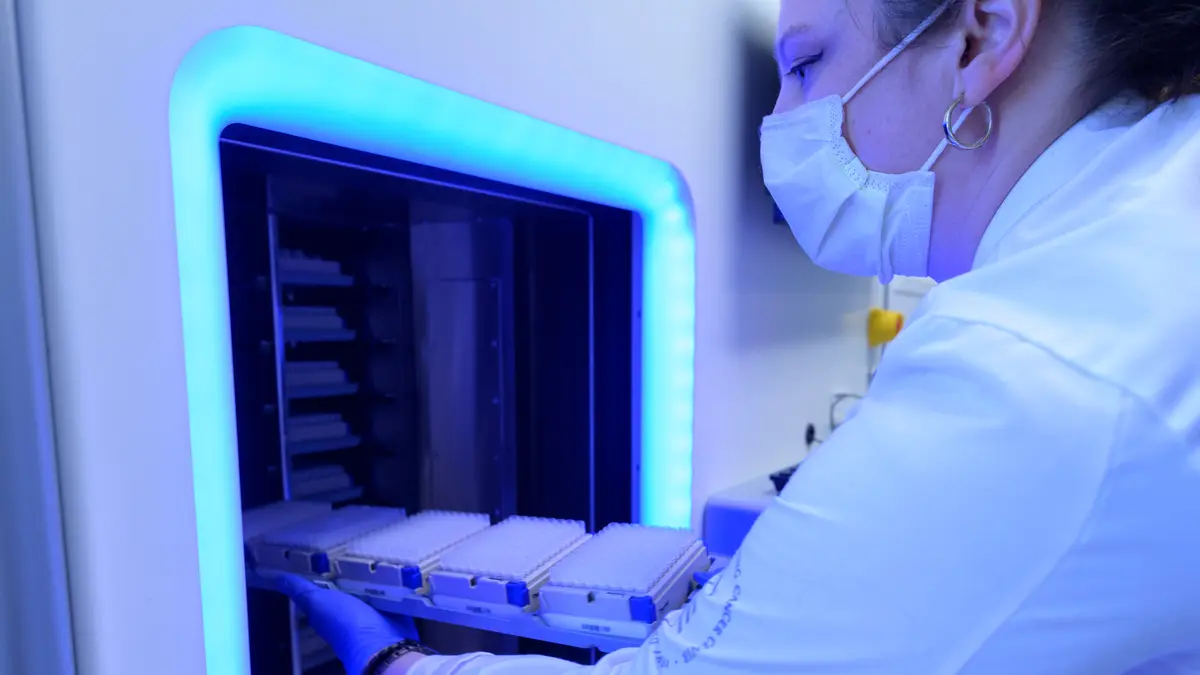
Radiation therapy uses high-energy X-rays to kill cancer cells. We use radiation therapy to treat people for types of anal cancer.

There are many options for anal cancer treatment. You may feel overwhelmed as you explore them.
This guide will help you better understand your options and get ready to talk with your doctors. You’ll have the information you need to make the best decisions for your care together.
Your care team includes doctors, nurses, and other experts in anal cancer. MSK’s anal cancer experts will make a treatment plan just for you.
Your anal cancer treatment plan will target the type and stage of anal cancer you have. It will be based on the latest research and therapies. During your treatment, you may have a few therapies for the best possible results.
Your MSK care team will talk with you about the best therapies for you. You may have 1 treatment, or a few treatments together.
Treatment for anal cancer can include:

Radiation therapy uses high-energy X-rays to kill cancer cells. We use radiation therapy to treat people for types of anal cancer.

Chemotherapy, targeted therapy, and immunotherapy are called systemic therapies. Treatments are given by pill or liquid, intravenous (IV) infusion, or injection (shot). They spread throughout the body to treat cancer.

Some people with anal cancer have surgery to remove the cancer. The type of surgery depends on the type of anal cancer, its location, and its stage.
We care for every person with anal cancer with kindness, warmth, and respect.
Your care team includes doctors, nurses, and other experts who focus on anal cancer. Together they use the latest science and research to create your care plan. It will focus on what matters most to you, and the treatment best for your type and stage of anal cancer.
At MSK, we take care of the person, not just the cancer. We offer support and resources to help you and your caregivers, during and after treatment.
Your care plan may include nutrition advice, physical therapy, exercise, and mental health support. Our rehabilitation experts help you manage the side effects of anal cancer and its treatment.

Molecular test development manager Tessara Baldi is an expert in processing test samples.
MSK's Center for Young Onset Colorectal and Gastrointestinal Cancer is the first program of its kind. Our treatment experts work together to care for the needs of young adults with these cancers. We also offer mental health counseling, fertility and sexual health medicine, nutrition and more.
MSK’s anal cancer experts will work with you to choose a treatment that’s best for you.
At MSK, your care is always a team effort. Our care teams combine the skill and experience of many kinds of anal cancer experts. They work together to give you the best cancer treatment.

Radiation oncologist Dr. John Cuaron and nurses Kristina Boyce and Jacquelyn Kochan at MSK in Commack, LI.
MSK has Magnet® designation for our nurses’ excellent patient care, strong leadership, and a culture that values constant improvement. Only about 1 out of every 10 hospitals in the country have Magnet status. It’s one of the highest honors a hospital can earn for nursing excellence.
Your care team has special training in how to diagnose and treat anal cancer. Their goal is to support you during and after treatment for anal cancer.
We take care of the person, not just the cancer. Our social workers are here to help you and your family with the emotional, social, and physical effects of cancer.
Your care team has doctors, nurses, and other healthcare providers who are experts in anal cancer. They include:
Your team meets with a panel of experts who review and talk about your diagnosis. They discuss new ideas and the latest research. This expert panel then works together to choose your treatment plan.
A colorectal surgeon is a doctor with special training in surgery on the colon and rectum.
A gastrointestinal (GAS-troh-in-TES-tih-nul) medical oncologist is a cancer doctor with special training in gastrointestinal (GI) cancers. This includes anal cancers.
A radiation oncologist is a cancer doctor with special training in using radiation therapy (RT) to treat cancer.
A radiologist is a doctor with special training in using imaging to diagnose and treat disease. Imaging includes X-rays, computed tomography (CT), and magnetic resonance imaging (MRI).
An advanced practice provider is a healthcare provider with special training who works alone or with your doctor to care for you. Examples are nurse practitioners (NPs) and physician assistants (PAs).
A social worker is a healthcare provider with special training in helping people cope with problems in their lives. They support you emotionally, socially, and physically by providing counseling and practical assistance.
A pathologist is a doctor who uses a microscope to make a diagnosis from cell and tissue samples. They analyze the samples to learn more about a health issue, such as cancer.
Our Care Advisors will match you with the right anal cancer experts for you.

Social worker Hadley Maya (right) is an expert in supporting young people who are treated at MSK for colorectal cancer.
Cancer treatment affects your body and emotions. The experience is not the same for everyone. We will support you during your treatment.
But you’re also a person with a life beyond cancer. We want to help you get back to it. That’s why we have many programs and services to support you and your loved ones.
You can connect with other people going through cancer treatment in our virtual support groups, led by a social worker.
Or you may need help with side effects of treatment. We have experts with special training in treating pain.
Your caregivers are a very important part of your care team. They need support, too. We have a Caregivers Clinic to help your loved ones cope with cancer.
Our Integrative Medicine and Wellness Service offers complementary, holistic, and natural therapies. This includes acupuncture, meditation, massage therapy, yoga, and exercise.
You may want support to cope with side effects of anal cancer treatment. These may include pain, fatigue (feeling very tired), nerve problems, nausea, insomnia, and stress.
Without using prescription drugs, integrative therapies can help improve and control side effects of cancer treatment.
Integrative medicine services are available in New York City, New Jersey, Westchester, and on Long Island. We also offer virtual classes and workshops.
Pain management is an important part of cancer care. MSK was the first cancer center in the country to have a service just for treating pain in people with cancer.
Our pain experts will help relieve or manage pain after surgery. They can help while you’re still in the hospital, and after you’re home.
We have experts who manage the symptoms and side effects of cancer treatment, such as nausea during chemotherapy.
We offer counseling and support to help you manage anxiety, depression, anger, or loneliness. There are individual and group counseling sessions, both in person and through telemedicine visits. Counseling is open to you and your family, separately or together.
We also run support groups and programs if you want to talk with other people going through a similar experience. Our social workers can offer information about how to talk about your diagnosis with family members, work colleagues, and friends.
Cancer treatment can affect your digestion (how your body breaks down the food you eat). It can change your taste, how you eat, and how hungry you are.
Our clinical dietitian nutritionists can help with:
Cancer affects your sex life in both physical and emotional ways. It’s normal to think about how cancer treatment may affect your sex life.
Our sexual health programs can help. They have experts in the physical symptoms and emotional challenges that may affect your sex life. We can talk with you about physical changes that affect intimacy.
MSK has experts with special training in female sexual health and fertility. Perhaps you’re trying to have a child or think you may want to start a family someday. We can help you understand your options for having children.
MSK is a place where people of all genders and sexual orientations feel welcome and treated with respect. Our LGBTQI+ Cancer Care Program gives you the support you need during cancer care. It’s for LGBTQI+ people getting screened or treated at MSK, or in our survivorship program.
We believe anal cancer care should be as convenient as possible. We have treatment locations near you in New York City, Westchester, on Long Island, and in New Jersey.
At our locations, you can meet with your care team and get your anal cancer treatment. You may be able to have chemotherapy or radiation therapy, or join a clinical trial.
MSK brings its expert care closer to you so you can get back home to what matters most.

We’ll guide you about where you can go for check-ups, procedures, or treatments, based on your diagnosis and treatments.